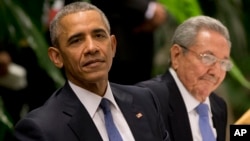The United States restored diplomatic relations with Cuba on July 20, 2015, but has maintained the commercial, economic, and financial embargo against the communist island.
President Barack Obama, however, has moved aggressively to also restore economic relations with the country, implementing a number of changes as recently as in October 2016.
The changes included the easing of restrictions on the island in an attempt to create more economic opportunities between the two countries. The administration approved a package of regulatory changes that was intended to expand scientific, humanitarian, trade and commercial opportunities between the U.S. and Cuba.
President Obama said "very real differences" on democracy and human rights still exist between the two countries but the best way to address the differences is through engagement.
The administration's plan was intended to promote joint medical research between the two countries, the sale of Cuban pharmaceuticals in the U.S. and banking opportunities for Americans in Cuba.
Humanitarian-related initiatives involving scholarships for scientific research and improving Cuba's infrastructure would also be expanded.
"These steps have the potential to accelerate constructive change and unlock greater economic opportunity for Cubans and Americans," Treasury Secretary Jacob Lew said in a statement.
From Kennedy to Obama
In March 2016, President Barack Obama became the first sitting U.S. president to visit Cuba since the Castro revolution, opening a new chapter in relations between Havana and Washington, but over the past half-century other American leaders also had tried to do the same.
In late 1962, after the Cuban missile crisis that brought the world to the brink of global nuclear conflict, then President John F. Kennedy explored the idea of normalizing relations with Cuba by capitalizing on Castro's displeasure that Moscow withdrew its missiles from the island without consulting him.
Kennedy asked an Algerian-French journalist, Jean Daniel, to convey a message to Castro in 1963, and Daniel later wrote that Castro and Kennedy "seemed ready to make peace." But the diplomatic project collapsed after Kennedy’s assassination in Texas on November 22 of that year, and former vice president Lyndon Johnson did not pursue the initiative when he took over at the White House.
In fact, suspicions abounded in some parts of the U.S. for years afterward that Cuba had had a role in orchestrating Kennedy's assassination.
During Gerald Ford's presidency in the mid-1970s, then secretary of state Henry Kissinger explored the idea of rapprochement with Cuba, under conditions of the utmost secrecy. The intervention of Cuban forces in Angola's civil war in 1975 killed Kissinger's efforts.
Breakthrough began in 2013
A few weeks after President Jimmy Carter took the presidential oath of office in 1977, he ordered a new round of talks in the hope of normalizing ties with Havana, but Cuba's military adventures in Africa in support of leftist causes and candidates doomed that initiative too.
Presidents Ronald Reagan, George H.W. Bush, Bill Clinton and George W. Bush maintained a foreign policy that ruled out any concessions toward Havana unless there was regime change in communist Cuba.
It was not until the spring of 2013, when President Obama was already in his second term, that he authorized the start of exploratory discussions with Havana. The first meeting took place in June that year in Canada, in full secrecy.
Pope brokered U.S.-Cuba talks
Pope Francis wrote to the U.S. and Cuban leaders - Obama and Raul Castro, who had by then succeeded his brother, Fidel, as president - urging them to normalize relations.
In October 2013, U.S. and Cuban delegations met in the Vatican, together with officials from the Holy See, to finalize the terms of re-establishing diplomatic ties. That development managed to stay out of the public eye until December 17, 2014, when Obama and Castro announced that Washington and Havana would resume diplomatic ties.
Trump threatens reversal of Cuba “Concessions”
During the presidential campaign, President-elect Donald Trump said he will reverse all of what he called the "concessions" President Obama made in an effort to normalize relations with Cuba, unless Havana meets certain demands.
"Those demands will include religious and political freedom for the Cuban people and the freeing of political prisoners," Trump said in Miami, home to a large Cuban population.
The real estate billionaire said "We're going to stand with the Cuban people in their fight against communist oppression. We're on the right side. Great people. They are great people. The president's one-sided deal for Cuba and with Cuba, benefits only the Castro regime."
In the past, Trump has said he supports normalized relations, but would have preferred a better deal.
Antonio G. Rodiles, a Cuban political activist, told VOA in an interview, that he thinks Castro will become "a shadow" that will disappear "little by little." Rodiles said the Cuban government was "trying to keep him alive in the minds of the Cuban people" by constantly using Castro's image on television and in the streets. Rodiles said, "...but now everything is going to be dissolved. He's going to disappear."
Fern Robinson contributed to this report.











